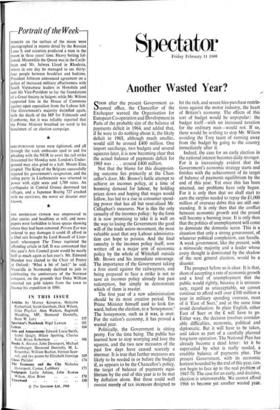Another Wasted Year?
QOON after the present Government as- L3sumed office, the Chancellor of the Exchequer warned the Organisation for European Co-operation and Development in Paris of the probable size of the balance of payments deficit in 1964, and added that, if he were to do nothing about it, the likely deficit in 1965, although much smaller, would still be around £400 million. One import surcharge, two budgets and several squeezes later, it is now becoming clear that the actual balance of payments deficit for 1965 was . . . around £400 million.
Not that the blame for this disappoint- ing outcome lies primarily at the Chan- cellor's door. Mr. Brown's futile attempt to achieve an incomes policy, at a time of booming demand for labour, by holding prices down and hoping that wages would follow, has led to a rise in consumer spend- ing power that has all but neutralised Mr. Callaghan's measures. Nor is this the only casualty of the incomes policy: by the form it is now promising to take it is well on the way to losing the Government the good will of the trade union movement, the most valuable asset that any Labour administra- tion can hope to possess. And the final casualty is the incomes policy itself, now written off as a major arm of economic policy by the whole of Whitehall outside Mr. Brown and his immediate entourage. The importance of the Government taking a firm stand against the railwaymen, and being prepared to face a strike is not to save an incomes policy already lost past redemption, but simply to demonstrate which of them is master.
The first year of a new administration should be its most creative period. The Prime Minister himself used to look for- ward, before the election, to a 'honeymoon.' The honeymoon, such as it was, is over. For the nation's economy, it has proved a wasted year.
Politically, the Government is sitting pretty. For the time being. The public has learned how to stop worrying and love the squeeze, and the two new measures of the past few days have caused scarcely a iinirrnur. It is true that further measures are likely to be needed in or before the budget if, as appears to be the Chancellor's policy, the target of balance of payments equi- librium by the end of this year is to be met by deflation alone. But these could well consist merely of tax increases designed to hit the rich, and severe hire-purchase restric- tions against the motor industry, the heart of Britain's economy. The effects of this sort of budget would be unpopular: the budget itself—with no increased taxation for the ordinary man—would not. If so, there would be nothing to stop Mr. Wilson avoiding the Tory taunt of running away from the budget by going to the country, immediately after it.
Indeed, the case for an early election in the national interest becomes daily stronger. For it is increasingly evident that the Government's economic strategy starts and finishes with the achievement of its target of balance of payments equilibrium by the end of this year. Yet once this has been attained, our problems have only begun. For it is only then that we shall start to earn the surplus needed to repay the £1,000 million of overseas debts that are still out- standing. It is only then that the conflict between economic growth and the pound will become a burning issue. It is only then that the politics of unemployment will come to dominate the domestic scene. This is a situation that only a strong government, of whatever political complexion, can handle. A weak government, like the present, with a minuscule majority and a leader whose every thought is dominated by the shadow of the next general election, would be a disaster.
The prospect before us is clear. It is that, short of accepting a rate of economic growth and a level of unemployment that the public would rightly, because it is unneces- sary, regard as unacceptable, we cannot continue to afford well over £300 million a year in military spending overseas, most of it 'East of Suez,' and at the same time avoid devaluation. In plain English, either East of Suez or the £ will have to go. Either way, the decision involves consider- able difficulties, economic, political and diplomatic. But it will have to be taken, and taken as part of a carefully planned long-term operation. The National Plan has already become a dead letter: let it be superseded by what is really needed, a credible balance of payments plan. The present Government, with its economic horizon bounded by the end of this year, can- not begin to face up to the real problem of 1967-70. The case for an early, and decisive, election is unanswerable. We cannot afford 1966 to become yet another wasted year


































 Previous page
Previous page